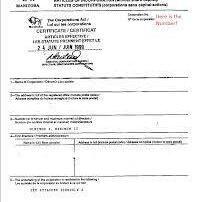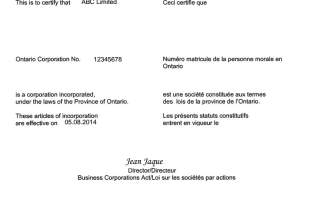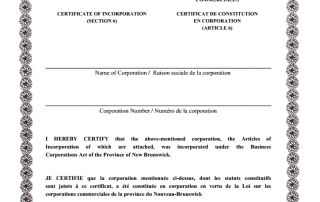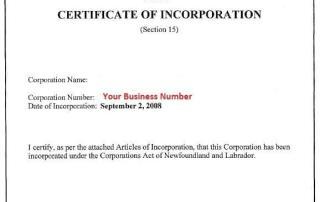Canadian Corporate Document Apostille
Incorporation Certificate Apostille or Authentication and Legalization, also known as Attestation, is a necessary process for Canadian registered companies that need to provide corporate documents for use outside of Canada for international business purposes. This involves either the two step: Authentication and Legalization for non Hague Apostille countries or an Apostille Certificate for member countries.
Why You May Need It
When dealing with international business or legal matters, it's often necessary to have Canadian corporate documents apostilled or authenticated and legalized. This process is crucial for several reasons:
- International Recognition: Apostille, authentication, and legalization ensure that Canadian corporate documents are recognized and accepted in foreign countries. This is particularly important for businesses expanding overseas or engaging in international partnerships.
- Legal Compliance: Many countries require foreign documents to be authenticated and legalized to comply with their local legal systems. This process verifies the legitimacy of the documents, ensuring they are legally valid in the destination country.
- Avoiding Legal Disputes: Properly apostilled or authenticated and legalized documents can prevent legal disputes related to the authenticity of the documents. This is vital for contracts, agreements, and legal transactions.
- Facilitating Transactions: In international trade, authenticated documents are often required for transactions like opening foreign bank accounts, registering a business, or conducting large financial transactions.
- Building Trust: When a company’s documents are apostilled or authenticated and legalized, it builds trust with foreign partners and authorities. It shows that the company is serious and compliant with international standards.
- Ease of Doing Business: These processes streamline international interactions by providing a recognized method of verifying documents. It makes cross-border business smoother and less bureaucratic.
- Protecting Against Fraud: Authentication and legalization help to protect against fraud by ensuring the documents are issued by a legitimate authority and have not been tampered with.
- Meeting Visa Requirements: For businesses sending employees abroad, certain visas might require authenticated corporate documents to prove the legitimacy of the business and its operations.
- Property Transactions: Buying or leasing property in a foreign country often requires authenticated corporate documents to complete the transaction legally.
- Mergers and Acquisitions: In cases of international mergers and acquisitions, authenticated and legalized documents are crucial for validating the terms and existence of the entities involved.
Understanding and complying with the requirements for apostilling, authenticating, and legalizing corporate documents is essential for any business operating on an international level. It ensures legal compliance, facilitates business transactions, and builds trust in foreign markets.
Do You Have The Correct Corporate Document For The Process?
To ensure that your Canadian corporate documents are legally valid in a foreign country, it is important to have the correct type of corporate document, such as a Certificate of Incorporation, Articles of Incorporation, Certificate of Amalgamation, Certificate of Good Standing, Director's Resolutions, CRA Certificate of Residency, or Representation Agreements.
Apostille or Authentication : Choosing The Correct Process
With Canada's accession to the Hague Apostille Convention on January 11, 2024, a significant change has occurred for Canadian businesses and individuals dealing with international document verification. The Apostille Convention simplifies the process of legalizing documents for use in other member countries, which is particularly beneficial for Canadian corporate documents intended for business activities in these countries.
What is the Hague Apostille Convention?
The Hague Apostille Convention, formally known as the Hague Convention of 5 October 1961 Abolishing the Requirement of Legalisation for Foreign Public Documents, is an international treaty that streamlined the authentication of documents among member countries. Before its adoption, legalizing documents for international use was a cumbersome process involving multiple layers of verification.
Canada's Participation and Its Impact
Canada's decision to join this convention marks a major shift in how Canadian documents are recognized internationally. This move is particularly advantageous for businesses, as it simplifies the process of conducting international transactions and operations.
How to Get an Apostille for Canadian Corporate Documents
- Document Preparation: Ensure the document is in the correct format and contains all necessary information.
- Obtaining an Apostille: Now that Canada has implemented the Convention, Canadian corporate documents can receive an Apostille stamp or certificate. This process verifies the authenticity of the document's signature, the capacity in which the person signing the document has acted, and, where appropriate, the identity of the seal or stamp it bears.
- Using Apostilled Documents Internationally: Documents with an Apostille are readily accepted in all member countries of the Convention. This eliminates the need for additional legalization by the embassy or consulate of the destination country.
Advantages for Canadian Businesses
- Efficiency: The Apostille process is faster and less bureaucratic than the traditional method of document legalization.
- Cost-Effective: Reduces the costs associated with legalizing documents for international use.
- Global Reach: Facilitates smoother international business operations and transactions in other member countries.
Canada's accession to the Hague Apostille Convention is a welcome development for Canadian businesses and individuals dealing with international affairs. This move not only enhances the ease of doing business globally but also aligns Canada with international standards in document verification. As a result, Canadian corporate entities can now enjoy streamlined processes, reduced costs, and increased efficiency in their international engagements.
Corporate Document Authentication and Legalization for Non-Apostille Countries
1
Step 1: Authentication
The first step of the Incorporation Certificate Authentication process is handled by the provincial authority or Global Affairs Canada and requires the corporate documents to be notarized or certified by a Canadian Notary Public. If you need help with notary services or are unsure if your corporate document meets the requirements of Global Affairs Canada, you can reach out to us for consultation.
It's important to start the authentication process as soon as possible, as processing times are longer than ever at Global Affairs Canada. You can find out their current processing time here.
2
Step 2: Legalization
The second step of the Incorporation Certificate Legalization process takes place at the embassy or consulate of the foreign country where you will be conducting business. This process may include fees and other requirements that can change frequently, so it is recommended to choose a professional document legalization service to ensure that the process is done correctly and meets your timeline.
How Does Using Global Document Solutions Services Benefit You?
Utilizing a professional service for the apostille or authentication of Canadian corporate documents offers substantial benefits. Experts in this field understand the complexities of these processes, ensuring your documents meet all legal standards. This minimizes the chance of errors and delays, which is essential for time-sensitive business affairs. When these tasks are not managed by professionals, there's a greater risk of mistakes like incorrect documentation or overlooking crucial steps, resulting in extended processing times or even rejection. In the sphere of official corporate documentation, precision and compliance with protocols are critical, and professional services offer the necessary expertise and peace of mind






